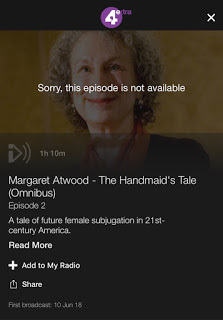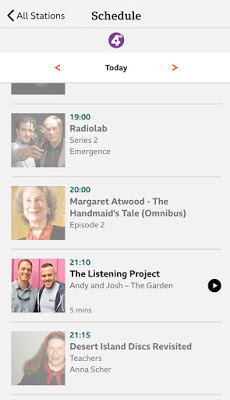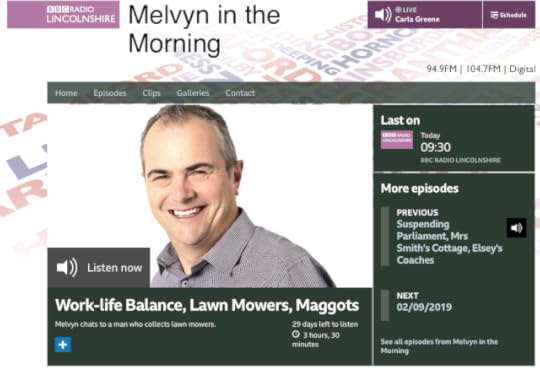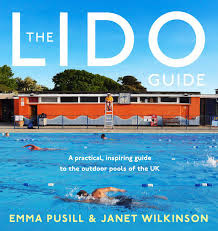Tim Atkinson's Blog, page 9
September 19, 2019
This Is Going to Hurt by Adam Kay
 This Is Going to Hurt: Secret Diaries of a Junior Doctor by Adam Kay
This Is Going to Hurt: Secret Diaries of a Junior Doctor by Adam KayMy rating: 4 of 5 stars
What's not to like about an entertaining and informative book about a service we all (almost) rely on? Well, plenty as it turns out. Not because the doctor/writer hasn't done his job and done it (both of them) well. But because of the shocking state of the service in question; because of the horror of having to make life-and-death decisions on next-to-no sleep after working shifts that border on conditions of modern slavery; because there are plenty of people out there (politicians, obviously but also, it seems, consultants who - rather like the school bully who thinks it's ok to nick the first years' dinner money 'cos he was bullied) seem to take rather less than their fair share of the burden.
I could be wrong. I'm no expert. Adam Kay is. And he's not alone. The system that demands such extremes of so many, the system that is woefully under-staffed, obviously under-funded and appallingly badly run is well documented by all except, perhaps, Jeremy Cunt. I wonder if the erstwhile Health Secretary read Adam's book at all during his dispute with junior doctors (which amount to ALL doctors below the level of consultant)?
I am something of a self-appointed expert as far as writing goes, I suppose. And in that capacity I can point out that the pay-off lines can become a bit relentless, partly as they come at the end of almost every diary entry and - as you’d expect in a book written in diary form that covers several years - there are plenty of them.
Nevertheless Adam Kay writes entertainingly enough for me to read every word - including the acknowledgements and footnotes - sometimes that I don’t think I’ve ever done before. It's a remarkable book and I'll be reading the follow-up as soon as it hits the shelves.
View all my reviews
Published on September 19, 2019 04:35
September 16, 2019
BBC Sounds...
... the death knell for iPlayer.
I heard it on the grapevine. Well, the news actually. At seven o'clock this morning. And it was obvious long before that.
From today, BBC Sounds takes over from the excellent inlayer radio. Yes, the app that boasts (in an annoying voice) of providing 'music, radio, podcasts' in one place is now where we'll all have to go to listen to the wireless on our phones or tablets, Macs and PCs. Provided they're up-to-date with the most recent operating system, that is!
Sounds isn't exactly a bad app. In some ways I can see why they've made the switch. Podcasts are the big bucks audio phenomenon and on dear old iPlayer radio the presenters had to all but beg you to subscribe or share, favourite or bookmark them.
It's all much easier (apparently) on BBC Sounds.
But it's also so much harder to like an app that it doesn't give anything like the level on information iPlayer does. Take this, for example. I want to find out what's actually being played in the first half Saturday's Last Night of the Proms concert. With iPlayer, it's easy:

With Sounds, nothing doing. It tells you the time it's on and the title of the programme. Nothing more.

In iPlayer, I can bookmark ahead. If I want to listen to the Omnibus of Margaret Atwood's Handmaid's Tale I can add it to favourites (which bookmarks it on Sounds) before it's even been broadcast. Of course it apologizes and tells me that this episode is not (yet) available but I can click 'Add' and have it waiting in my favourites when it is. Simple!

But on BBC Sounds the show is greyed-out, mute, unclick-able, dead. You have to wait until it's been on-air which somehow seems to defeat the very object of the Sounds app.

Of course, all this is no more the slightly irritating. But when an organisation replaces something that works well with something so much worse, it's highly irritating. Annoying, even.
And what's worse is that you can't even complain. I've tweeted screen-grabs like these to @BBCSounds loads, and got nadda response. I've gone through the laborious process of reporting my concerns on the BBC desktop site. No good. You go so far with a complaint about BBC Sounds before being returned to an earlier page. They clearly think the app is faultless.
So, for the record, here's my post on the subject. I make it available to the BBC and anyone else who might be interested in the probably vain hope that they'll do something about it.
But I doubt it. They seem (rather like several others we could mention) deaf to all views except their own and determined to forge ahead with a disastrous policy in spite of all evidence and entreaties.
'Sounds' familiar!
I heard it on the grapevine. Well, the news actually. At seven o'clock this morning. And it was obvious long before that.
From today, BBC Sounds takes over from the excellent inlayer radio. Yes, the app that boasts (in an annoying voice) of providing 'music, radio, podcasts' in one place is now where we'll all have to go to listen to the wireless on our phones or tablets, Macs and PCs. Provided they're up-to-date with the most recent operating system, that is!
Sounds isn't exactly a bad app. In some ways I can see why they've made the switch. Podcasts are the big bucks audio phenomenon and on dear old iPlayer radio the presenters had to all but beg you to subscribe or share, favourite or bookmark them.
It's all much easier (apparently) on BBC Sounds.
But it's also so much harder to like an app that it doesn't give anything like the level on information iPlayer does. Take this, for example. I want to find out what's actually being played in the first half Saturday's Last Night of the Proms concert. With iPlayer, it's easy:

With Sounds, nothing doing. It tells you the time it's on and the title of the programme. Nothing more.

In iPlayer, I can bookmark ahead. If I want to listen to the Omnibus of Margaret Atwood's Handmaid's Tale I can add it to favourites (which bookmarks it on Sounds) before it's even been broadcast. Of course it apologizes and tells me that this episode is not (yet) available but I can click 'Add' and have it waiting in my favourites when it is. Simple!

But on BBC Sounds the show is greyed-out, mute, unclick-able, dead. You have to wait until it's been on-air which somehow seems to defeat the very object of the Sounds app.

Of course, all this is no more the slightly irritating. But when an organisation replaces something that works well with something so much worse, it's highly irritating. Annoying, even.
And what's worse is that you can't even complain. I've tweeted screen-grabs like these to @BBCSounds loads, and got nadda response. I've gone through the laborious process of reporting my concerns on the BBC desktop site. No good. You go so far with a complaint about BBC Sounds before being returned to an earlier page. They clearly think the app is faultless.
So, for the record, here's my post on the subject. I make it available to the BBC and anyone else who might be interested in the probably vain hope that they'll do something about it.
But I doubt it. They seem (rather like several others we could mention) deaf to all views except their own and determined to forge ahead with a disastrous policy in spite of all evidence and entreaties.
'Sounds' familiar!
Published on September 16, 2019 04:08
September 3, 2019
Back-to-school...
It's back-to-school time once again only, this time, it's a new one - school, that it, for the eponymous hero of this blog. (You didn't think that was me, did you?)
Charlie starts secondary school today, looking smart in his new school uniform with tie tied and hair combed and shoes polished. It's a nerve-wracking time (and that's just the parents!). Actually Charlie has been (or seemed) quite phlegmatic about the whole thing. I think it helped that he had a large input into his choice of school.
He took the 11+ (yes, welcome to the 1950s), 'passed' (as-it-were) and passed well, therefore keeping all his options open. That meant he was able to choose the school he liked best with no other considerations. He enjoyed his induction days at the end of last term and while not exactly counting down the days until the start of the new school year at least he hasn't been viewing it with the same dread I did.
Mind you, I 'transitioned' several times, both by dint of moving house and by living in areas that had primary, middle, and high schools, all of which added to the pressure. And although I'd always quite liked primary school (despite coming home on day one and being surprised to learn I had to go back again the next day - apparently I told my mum I'd 'been there, done that' or words to that effect!) I disliked secondary (or middles, then secondaries) with increasing passion.
But that's another story. Mine, not Charlie's.
And today's about him.
Roll on 3.25pm!

Charlie starts secondary school today, looking smart in his new school uniform with tie tied and hair combed and shoes polished. It's a nerve-wracking time (and that's just the parents!). Actually Charlie has been (or seemed) quite phlegmatic about the whole thing. I think it helped that he had a large input into his choice of school.
He took the 11+ (yes, welcome to the 1950s), 'passed' (as-it-were) and passed well, therefore keeping all his options open. That meant he was able to choose the school he liked best with no other considerations. He enjoyed his induction days at the end of last term and while not exactly counting down the days until the start of the new school year at least he hasn't been viewing it with the same dread I did.
Mind you, I 'transitioned' several times, both by dint of moving house and by living in areas that had primary, middle, and high schools, all of which added to the pressure. And although I'd always quite liked primary school (despite coming home on day one and being surprised to learn I had to go back again the next day - apparently I told my mum I'd 'been there, done that' or words to that effect!) I disliked secondary (or middles, then secondaries) with increasing passion.
But that's another story. Mine, not Charlie's.
And today's about him.
Roll on 3.25pm!

Published on September 03, 2019 04:01
August 30, 2019
Work-life balance... and a jar of maggots
Ruth Davidson's announcement yesterday that she's giving up the leadership of the Scottish Tories to 'spend more time with her family' has inevitably attracted plenty of attention.
Not all of it has been about what she claims are the real reasons for her stepping down. She wants to spend time with her young son. She doesn't want to be away from home, campaigning, for so long. Something she once loved (fighting elections) has now not only lost its allure, it fills her with dread.
I can understand most of that. I did the same thing ten years ago and - it being something of a novelty at the time for a dad to give up work to stay at home, it was something people used to want me to talk about. Which is what I did again, today, on BBC Lincs. You can listen to it here should you wish. Just ff to 17mins, just after the bit about maggots(!) and you'll find me.
I don't think the two things are related...

Not all of it has been about what she claims are the real reasons for her stepping down. She wants to spend time with her young son. She doesn't want to be away from home, campaigning, for so long. Something she once loved (fighting elections) has now not only lost its allure, it fills her with dread.
I can understand most of that. I did the same thing ten years ago and - it being something of a novelty at the time for a dad to give up work to stay at home, it was something people used to want me to talk about. Which is what I did again, today, on BBC Lincs. You can listen to it here should you wish. Just ff to 17mins, just after the bit about maggots(!) and you'll find me.
I don't think the two things are related...

Published on August 30, 2019 06:52
August 15, 2019
Testing, testing...
It's that time of year again, the day when local newspaper photographers everywhere try to get photos like this...

or this...

or even this...

So predictable.
So is the coverage of their print or broadcast colleagues who usually try some way of devaluing the results, criticising teachers, claiming it was all much harder last year (or when they took the exam) and so on. And on. Yawn.
What never seems to be discussed (at least, not often) is this.
Why do we persist with this cockamamy system of applying for a place at university before (not after) results come out?
In what other walk of life would you be asked to apply for something that required a certain level of accreditation before securing it? Oh yes, I know you need to be a qualified in medicine to apply for a job as a surgeon, but I'm working on it. I watch Holby City every day!
Perhaps self-styled 'mental heavyweight' advisor Dominic Cummings and his self-styled 'intelligent' political master Michael Gove could have turned their combined brain to this when running education, rather than changing GCSE grades A-G to grades 1-9 (yes, they couldn't even count!) and other such footling fiddling at the margins of the problem.
But no. Everyone wants to spend the day arguing about grade inflation and unconditional offers (surely a big hint that the current system isn't working) rather than tackle the problem, or tackle those who for years, while in charge, failed to tackle the problem.
There has at last been some discussion on the subject as we approached this year's exam results day. But the headlines this morning were, predictably enough, all about grade boundaries and getting offers without even needing any grades, and what that might have done to grades, and how university admissions departments might be punished for daring to want some control over the process.
But my bet it'll be a long, long time (if ever) before someone has the courage (and intelligence) to tackle such an issue.
Bit like the drugs problem. But then, like education, that's something they all think they know something about. Because, of course, they all went to school.
And they've all taken drugs.
At least, Michael Gove has.

or this...

or even this...

So predictable.
So is the coverage of their print or broadcast colleagues who usually try some way of devaluing the results, criticising teachers, claiming it was all much harder last year (or when they took the exam) and so on. And on. Yawn.
What never seems to be discussed (at least, not often) is this.
Why do we persist with this cockamamy system of applying for a place at university before (not after) results come out?
In what other walk of life would you be asked to apply for something that required a certain level of accreditation before securing it? Oh yes, I know you need to be a qualified in medicine to apply for a job as a surgeon, but I'm working on it. I watch Holby City every day!
Perhaps self-styled 'mental heavyweight' advisor Dominic Cummings and his self-styled 'intelligent' political master Michael Gove could have turned their combined brain to this when running education, rather than changing GCSE grades A-G to grades 1-9 (yes, they couldn't even count!) and other such footling fiddling at the margins of the problem.
But no. Everyone wants to spend the day arguing about grade inflation and unconditional offers (surely a big hint that the current system isn't working) rather than tackle the problem, or tackle those who for years, while in charge, failed to tackle the problem.
There has at last been some discussion on the subject as we approached this year's exam results day. But the headlines this morning were, predictably enough, all about grade boundaries and getting offers without even needing any grades, and what that might have done to grades, and how university admissions departments might be punished for daring to want some control over the process.
But my bet it'll be a long, long time (if ever) before someone has the courage (and intelligence) to tackle such an issue.
Bit like the drugs problem. But then, like education, that's something they all think they know something about. Because, of course, they all went to school.
And they've all taken drugs.
At least, Michael Gove has.
Published on August 15, 2019 06:40
August 6, 2019
Beat Summer Learning Loss with EdPlus
Summer learning loss is a thing. It even has its own Wikipedia page.
You've probably heard all about it anyway. Teachers (I used to be one) always worry about all the hard work that their pupils have been doing all year disappearing. Your children's teachers may even have set some holiday homework.
But try as you might it can be difficult to just keep the learning engine ticking over. Which is where EdPlus might come in handy.
Charlie liked it so much that he made this video about it. I like it because when the kids ask if they can play out/play on the Xbox/play with their friends I can easily say 'yes' then, 'five minutes of Edplus first.'
And, you know what? They DON'T MOAN!
Amazing...
About Edplus:
Oxford-based education technology start-up Edplus has launched a mobile app which allows children to learn their times tables for free in a new way, challenging and complementing traditional teaching methods. Developed by Francis Brown, a Professor of Mathematics at the University of Oxford, the technology uses an algorithm that creates a learning pathway unique to each child, adapting and improving as they play.
Children across the world have been learning their times tables for over 2,000 years, by various methods and with differing degrees of success. Times tables are typically learned by heart in a prescribed order but Edplus incorporates an adaptive algorithm developed by Professor Brown. This permits a more fluid and personalised approach.
The app is now available to download from Google Play Store, App Store and Amazon Apps:
https://edplus.app.link/edplus-web
Speaking about the app, Professor Brown explains:
"Instead of dictating an order in which children should learn their times tables, the Edplus algorithm takes a flexible approach. It takes into account the fact that a child may grasp one concept quicker than another without any predefined expectation of what that might be."
"It then builds out from this using the idea of ‘topology of knowledge'. A simple example is if a child shows that they know 2 x 7, the algorithm might introduce the related question 7 x 2. This might sound obvious but the national curriculum only expects children to know their seven times table by the end of year four, some two years after their two times table."
As more questions are answered through Edplus, the topology of knowledge of different children - in other words - a map of what they know and how they learn, is progressively built up. In essence, the software promises to get smarter and more effective with use. Professor Brown, who is more accustomed to the challenges of quantum field theory than multiplication, continues:
"Becoming a father has caused me to question conventional wisdom about elementary maths. I don't want my children to spend four years learning just 78 number facts. Times tables are a basic building block of more advanced mathematics and it is vital that children attain mastery in them as efficiently and enjoyably as possible."
The app coincides with the introduction by the UK government of a nationwide test for year four pupils (age 8-9), starting in the 2019-20 academic year, to assess whether they can recall their multiplication tables fluently.
Edplus - an Oxford University spinout company - has promised to make the times tables component of its app free worldwide. Toby Staveley, CEO at Edplus said:
"We combine a fresh approach to times tables with lots of features to keep children engaged. Times tables are often learned out-of-school where there is a sizeable inequality of opportunity. Our technology makes out-of-school learning easier for parents, more fun for children and can ultimately help reduce the attainment gap."
You've probably heard all about it anyway. Teachers (I used to be one) always worry about all the hard work that their pupils have been doing all year disappearing. Your children's teachers may even have set some holiday homework.
But try as you might it can be difficult to just keep the learning engine ticking over. Which is where EdPlus might come in handy.
Charlie liked it so much that he made this video about it. I like it because when the kids ask if they can play out/play on the Xbox/play with their friends I can easily say 'yes' then, 'five minutes of Edplus first.'
And, you know what? They DON'T MOAN!
Amazing...
About Edplus:
Oxford-based education technology start-up Edplus has launched a mobile app which allows children to learn their times tables for free in a new way, challenging and complementing traditional teaching methods. Developed by Francis Brown, a Professor of Mathematics at the University of Oxford, the technology uses an algorithm that creates a learning pathway unique to each child, adapting and improving as they play.
Children across the world have been learning their times tables for over 2,000 years, by various methods and with differing degrees of success. Times tables are typically learned by heart in a prescribed order but Edplus incorporates an adaptive algorithm developed by Professor Brown. This permits a more fluid and personalised approach.
The app is now available to download from Google Play Store, App Store and Amazon Apps:
https://edplus.app.link/edplus-web
Speaking about the app, Professor Brown explains:
"Instead of dictating an order in which children should learn their times tables, the Edplus algorithm takes a flexible approach. It takes into account the fact that a child may grasp one concept quicker than another without any predefined expectation of what that might be."
"It then builds out from this using the idea of ‘topology of knowledge'. A simple example is if a child shows that they know 2 x 7, the algorithm might introduce the related question 7 x 2. This might sound obvious but the national curriculum only expects children to know their seven times table by the end of year four, some two years after their two times table."
As more questions are answered through Edplus, the topology of knowledge of different children - in other words - a map of what they know and how they learn, is progressively built up. In essence, the software promises to get smarter and more effective with use. Professor Brown, who is more accustomed to the challenges of quantum field theory than multiplication, continues:
"Becoming a father has caused me to question conventional wisdom about elementary maths. I don't want my children to spend four years learning just 78 number facts. Times tables are a basic building block of more advanced mathematics and it is vital that children attain mastery in them as efficiently and enjoyably as possible."
The app coincides with the introduction by the UK government of a nationwide test for year four pupils (age 8-9), starting in the 2019-20 academic year, to assess whether they can recall their multiplication tables fluently.
Edplus - an Oxford University spinout company - has promised to make the times tables component of its app free worldwide. Toby Staveley, CEO at Edplus said:
"We combine a fresh approach to times tables with lots of features to keep children engaged. Times tables are often learned out-of-school where there is a sizeable inequality of opportunity. Our technology makes out-of-school learning easier for parents, more fun for children and can ultimately help reduce the attainment gap."
Published on August 06, 2019 05:30
July 31, 2019
BIC KIDS Young Artist Award 2019
Remember last week? That was summer, in case you missed it. And if, like me, you've got kids at home wondering what to do as the rain falls, this might just be for you.
It's the BIC® KIDS Young Artist Award and it's open for entries from all 5- to 11-year-olds NOW!
And it will be rewarding the creativity of children from across the country by offering them the opportunity to see their artwork graduate from the fridge door (where BIC's research says it is most frequently displayed) to billboards.
Entrants are encouraged to exercise their artistic flair, let their imaginations run wild and draw with complete freedom. Once kids have created their showstoppers, parents can enter by simply visiting www.bickids.co.uk/youngartist and uploading the artwork before the deadline on Sunday, Aug. 4.
Once entries close on Aug. 4, BIC’s expert judging panel will select one finalist from each region, whose amazing artwork will be used on local billboards throughout the voting stage of this year’s BIC® KIDS Young Artist Award.
The 13 finalists will also receive a certificate and a bundle of BIC® KIDS goodies. Specifically designed to help children hone their artistic talent, the hampers will include an array of exciting stationery products including the BIC® KIDS Evolution Ecolutions® Colouring Pencils and BIC® KIDS Kid Couleur Felt Tip Colouring Pens.
Once the public has decided who will be crowned the overall champion for the 2019 BIC® KIDS Young Artist Award, the winner will have his or her artwork published on a combination of 6-sheet posters and a 48-sheet billboard.
Full terms and conditions for the BIC KIDS Young Artist Award can be found at www.bickids.co.uk/youngartist.

It's the BIC® KIDS Young Artist Award and it's open for entries from all 5- to 11-year-olds NOW!
And it will be rewarding the creativity of children from across the country by offering them the opportunity to see their artwork graduate from the fridge door (where BIC's research says it is most frequently displayed) to billboards.
Entrants are encouraged to exercise their artistic flair, let their imaginations run wild and draw with complete freedom. Once kids have created their showstoppers, parents can enter by simply visiting www.bickids.co.uk/youngartist and uploading the artwork before the deadline on Sunday, Aug. 4.
Once entries close on Aug. 4, BIC’s expert judging panel will select one finalist from each region, whose amazing artwork will be used on local billboards throughout the voting stage of this year’s BIC® KIDS Young Artist Award.
The 13 finalists will also receive a certificate and a bundle of BIC® KIDS goodies. Specifically designed to help children hone their artistic talent, the hampers will include an array of exciting stationery products including the BIC® KIDS Evolution Ecolutions® Colouring Pencils and BIC® KIDS Kid Couleur Felt Tip Colouring Pens.
Once the public has decided who will be crowned the overall champion for the 2019 BIC® KIDS Young Artist Award, the winner will have his or her artwork published on a combination of 6-sheet posters and a 48-sheet billboard.
Full terms and conditions for the BIC KIDS Young Artist Award can be found at www.bickids.co.uk/youngartist.

Published on July 31, 2019 08:06
July 19, 2019
Lest we forget
One hundred years ago today, July 19th 1919, 15000 British and Empire troops paraded past a temporary, wood and plaster monument in Whitehall as part of a parade marking the official end of World War One.

But Sir Edwin Lutyens, the architect, had been given only weeks to complete the project, the first sketches of which he'd drawn on the back of a napkin. And just days after the parade the entire structure was due to be dismantled.
Then something remarkable happened. Wreaths and floral tributes at the foot of The Cenotaph grew and grew. It became clear that Lutyens' catafalque had touched a nerve among a nation in mourning. So, although there had been no intention to make The Cenotaph a permanent monument, pressure began to build. There were questions in Parliament, leaders in The Times and letters to the 'papers. Clearly something had to be done.

Even before the war ended work was being done on how it would be remembered. Sir Edwin Lutyens had been to France with the newly-founded Imperial War Graves Commission as early as 1917. There, on the old battlefields, he found 'wild flowers that are as friendly to an unexploded shell as they are to the leg of a garden seat in Surrey.' He wrote to his wife of 'the ribbon of isolated graves like a milky way across miles of country where men are tucked in where they fell. Ribbons of little crosses each touching each other across a cemetery, set in a wilderness of annuals and where one sort of flower is grown the effect if charming, easy and oh so pathetic. One things for a moment that no other monument is needed.' But it was. And Lutyens knew it. Once the war was over, the nation knew that Lutyens was the man to provide it.
The first cenotaph designed by him was not, in fact, the hastily erected monument in Whitehall. On 22 January 1919 Lutyens had been invited to Southampton to view potential sites for the city's war memorial. Though the design of this civic monument were to change, the end result is strikingly similar to the Whitehall cenotaph, so much so it might almost be regarded as a prototype.

Having already got the basic design principle sorted, it was no surprise that Lutyens chose a similar structure for the hastily built temporary cenotaph in Whitehall. Although plans for a Peace or 'Victory' parade had been in hand for some time, they were on hold both until the formal peace treaty (The Treaty of Versailles) was signed and until the French (who were to be guests at the British ceremony) had decided what they were going to do to mark the final, formal end of war.
What was a surprise was how much the monument seemed to mean to so many people. It soon became obvious that the temporary monument intended only as a symbolic structure for the parade down Whitehall was too important to lose. Questions were asked in Parliament; on 26 July an editorial in The Times called for a permanent replacement; many letters of support appeared in the press. On 30 July the Cabinet met and agreed that a permanent monument should be erected. The only remaining question was... where?
There was understandable disquiet about placing the Cenotaph in the middle of a busy London thoroughfare. The same Times leader demanding a permanent structure suggested Horse Guards Parade as a more fitting location. The London Traffic Advisory Committee suggested Parliament Square. But Lutyens was adamant. The site in Whitehall had been 'qualified by the salutes of Foch and the allied armies and by our men and their great leaders. No other site would give this pertinence.'
Whitehall it was.

But Sir Edwin Lutyens, the architect, had been given only weeks to complete the project, the first sketches of which he'd drawn on the back of a napkin. And just days after the parade the entire structure was due to be dismantled.
Then something remarkable happened. Wreaths and floral tributes at the foot of The Cenotaph grew and grew. It became clear that Lutyens' catafalque had touched a nerve among a nation in mourning. So, although there had been no intention to make The Cenotaph a permanent monument, pressure began to build. There were questions in Parliament, leaders in The Times and letters to the 'papers. Clearly something had to be done.

Even before the war ended work was being done on how it would be remembered. Sir Edwin Lutyens had been to France with the newly-founded Imperial War Graves Commission as early as 1917. There, on the old battlefields, he found 'wild flowers that are as friendly to an unexploded shell as they are to the leg of a garden seat in Surrey.' He wrote to his wife of 'the ribbon of isolated graves like a milky way across miles of country where men are tucked in where they fell. Ribbons of little crosses each touching each other across a cemetery, set in a wilderness of annuals and where one sort of flower is grown the effect if charming, easy and oh so pathetic. One things for a moment that no other monument is needed.' But it was. And Lutyens knew it. Once the war was over, the nation knew that Lutyens was the man to provide it.
The first cenotaph designed by him was not, in fact, the hastily erected monument in Whitehall. On 22 January 1919 Lutyens had been invited to Southampton to view potential sites for the city's war memorial. Though the design of this civic monument were to change, the end result is strikingly similar to the Whitehall cenotaph, so much so it might almost be regarded as a prototype.

Having already got the basic design principle sorted, it was no surprise that Lutyens chose a similar structure for the hastily built temporary cenotaph in Whitehall. Although plans for a Peace or 'Victory' parade had been in hand for some time, they were on hold both until the formal peace treaty (The Treaty of Versailles) was signed and until the French (who were to be guests at the British ceremony) had decided what they were going to do to mark the final, formal end of war.
What was a surprise was how much the monument seemed to mean to so many people. It soon became obvious that the temporary monument intended only as a symbolic structure for the parade down Whitehall was too important to lose. Questions were asked in Parliament; on 26 July an editorial in The Times called for a permanent replacement; many letters of support appeared in the press. On 30 July the Cabinet met and agreed that a permanent monument should be erected. The only remaining question was... where?
There was understandable disquiet about placing the Cenotaph in the middle of a busy London thoroughfare. The same Times leader demanding a permanent structure suggested Horse Guards Parade as a more fitting location. The London Traffic Advisory Committee suggested Parliament Square. But Lutyens was adamant. The site in Whitehall had been 'qualified by the salutes of Foch and the allied armies and by our men and their great leaders. No other site would give this pertinence.'
Whitehall it was.
Published on July 19, 2019 03:25
June 5, 2019
In the swim...
I enjoyed my first sea swim of the season over half-term. (That makes it sound as though it's something I do regularly which - although true once - is not quite accurate now.) But we were in Weymouth on Bank Holiday Monday and the sea looked loverly...

During my first year at university my parents moved to a small seaside town on the Yorkshire coast. That summer I spent most of my time in the garden reading my course books and sunbathing. Then, at about three o’clock, I’d wander down to the sea for a swim. It became a thing. Without really intending to I went swimming every day that summer, whatever the weather—including one memorable afternoon during a thunderstorm. It was like a longer version of the summer holidays we used to spend in Scarborough, swimming either in the sea or in the old sea-water South Bay Lido, now sadly no more.
Then October came and term began and I was once more reduced to the calm, chlorinated sterility of the indoor pool near the university. I started out with the intention of going daily, but it soon became every other day and then trickled to weekly before fizzling out completely. The swimming wasn’t the problem. It was the pool. There was nothing to match the salt-spray and the waves and the open air. True, the sea was cold, even in the middle of summer. But the cold seemed good. Invigorating. Inspiring. I’d return to my books with an increased resolve and get far more done in a couple of late-afternoon hours than I’d probably achieved all day until then. I really should have gone swimming every morning.
My love of outdoor swimming never left me but burned lower as the years went on. Taking the children swimming usually involves the local indoor pool (it's warmer) though there's a really excellent Lido not too far from here, at Woodhall Spa. And it's featured in this excellent (just-published, lavishly illustrated) 'practical guide to the outdoor pools of UK':

Two books have really inspired my newly-restored determination to swim outdoors. And this - The Lido Guide - is one of them. It's full of all the kinds of practical information you need to plan your swim (postcodes, parking, payment information and so on) but also written in a way (and accompanied by photographs) that makes you want to just strip off and dive in. It's wonderful. Inspiring. And highly recommended.
And the second book? That's a secret as it isn't written yet. It's one I'm working on, one about the chronic pain I suffer from and one in which I investigate the alternatives to analgesics. And yes, you've guessed it, one of them is cold water swimming.
Watch this space!

During my first year at university my parents moved to a small seaside town on the Yorkshire coast. That summer I spent most of my time in the garden reading my course books and sunbathing. Then, at about three o’clock, I’d wander down to the sea for a swim. It became a thing. Without really intending to I went swimming every day that summer, whatever the weather—including one memorable afternoon during a thunderstorm. It was like a longer version of the summer holidays we used to spend in Scarborough, swimming either in the sea or in the old sea-water South Bay Lido, now sadly no more.
Then October came and term began and I was once more reduced to the calm, chlorinated sterility of the indoor pool near the university. I started out with the intention of going daily, but it soon became every other day and then trickled to weekly before fizzling out completely. The swimming wasn’t the problem. It was the pool. There was nothing to match the salt-spray and the waves and the open air. True, the sea was cold, even in the middle of summer. But the cold seemed good. Invigorating. Inspiring. I’d return to my books with an increased resolve and get far more done in a couple of late-afternoon hours than I’d probably achieved all day until then. I really should have gone swimming every morning.
My love of outdoor swimming never left me but burned lower as the years went on. Taking the children swimming usually involves the local indoor pool (it's warmer) though there's a really excellent Lido not too far from here, at Woodhall Spa. And it's featured in this excellent (just-published, lavishly illustrated) 'practical guide to the outdoor pools of UK':

Two books have really inspired my newly-restored determination to swim outdoors. And this - The Lido Guide - is one of them. It's full of all the kinds of practical information you need to plan your swim (postcodes, parking, payment information and so on) but also written in a way (and accompanied by photographs) that makes you want to just strip off and dive in. It's wonderful. Inspiring. And highly recommended.
And the second book? That's a secret as it isn't written yet. It's one I'm working on, one about the chronic pain I suffer from and one in which I investigate the alternatives to analgesics. And yes, you've guessed it, one of them is cold water swimming.
Watch this space!
Published on June 05, 2019 02:25
May 25, 2019
Swifts!
Yes, they’re back. Which means (as Ted Hughes said) the world’s still working. You’ll have to take it from me that this is a genuine picture of one, spied today. I’ve seen swallows, too: they’re suddenly all there, filling g the summer skies when just a day or two ago, here in Lincolnshire, there were none. As you get older I think you get more excited by the nature’s annual rounds... at least, I do. As A.E.Housman said, “take from seventy springs a score/It only leave me fifty more.” In my case, take from seventy spring two score and ten. That really doesn’t leave long. So, forgive me for being just a little bit excited...


Published on May 25, 2019 11:48



